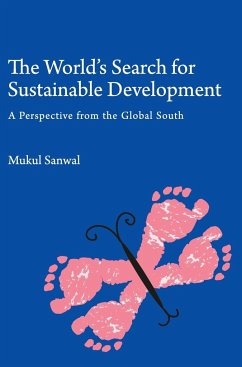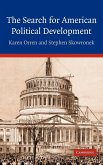Mukul Sanwal
The World's Search for Sustainable Development
Mukul Sanwal
The World's Search for Sustainable Development
- Gebundenes Buch
- Merkliste
- Auf die Merkliste
- Bewerten Bewerten
- Teilen
- Produkt teilen
- Produkterinnerung
- Produkterinnerung
This text explores the evolution of sustainable development and climate change within the framework of the United Nations.
Andere Kunden interessierten sich auch für
![The Search for Reconciliation The Search for Reconciliation]() Yinan HeThe Search for Reconciliation26,99 €
Yinan HeThe Search for Reconciliation26,99 €![The Search for Interstate Reconciliation in East Asia and Central Europe The Search for Interstate Reconciliation in East Asia and Central Europe]() Yinan HeThe Search for Interstate Reconciliation in East Asia and Central Europe130,99 €
Yinan HeThe Search for Interstate Reconciliation in East Asia and Central Europe130,99 €![Protecting the World's Children Protecting the World's Children]() UnicefProtecting the World's Children50,99 €
UnicefProtecting the World's Children50,99 €![The Search for American Political Development The Search for American Political Development]() Karen OrrenThe Search for American Political Development113,99 €
Karen OrrenThe Search for American Political Development113,99 €![Politics and the Search for the Common Good Politics and the Search for the Common Good]() Hans SlugaPolitics and the Search for the Common Good100,99 €
Hans SlugaPolitics and the Search for the Common Good100,99 €![The Search for Rational Drug Control The Search for Rational Drug Control]() Franklin E. ZimringThe Search for Rational Drug Control97,99 €
Franklin E. ZimringThe Search for Rational Drug Control97,99 €![Gene Banks and the World's Food Gene Banks and the World's Food]() Donald L. PlucknettGene Banks and the World's Food114,99 €
Donald L. PlucknettGene Banks and the World's Food114,99 €-
-
-
This text explores the evolution of sustainable development and climate change within the framework of the United Nations.
Hinweis: Dieser Artikel kann nur an eine deutsche Lieferadresse ausgeliefert werden.
Hinweis: Dieser Artikel kann nur an eine deutsche Lieferadresse ausgeliefert werden.
Produktdetails
- Produktdetails
- Verlag: Cambridge University Press
- Seitenzahl: 334
- Erscheinungstermin: 11. November 2015
- Englisch
- Abmessung: 250mm x 175mm x 23mm
- Gewicht: 757g
- ISBN-13: 9781107122666
- ISBN-10: 110712266X
- Artikelnr.: 44271783
- Herstellerkennzeichnung
- Libri GmbH
- Europaallee 1
- 36244 Bad Hersfeld
- gpsr@libri.de
- Verlag: Cambridge University Press
- Seitenzahl: 334
- Erscheinungstermin: 11. November 2015
- Englisch
- Abmessung: 250mm x 175mm x 23mm
- Gewicht: 757g
- ISBN-13: 9781107122666
- ISBN-10: 110712266X
- Artikelnr.: 44271783
- Herstellerkennzeichnung
- Libri GmbH
- Europaallee 1
- 36244 Bad Hersfeld
- gpsr@libri.de
Mukul Sanwal obtained a Master's degree in Public Administration from Harvard University, Massachusetts. He joined the Indian Administrative Service in 1971 and served as a senior member in various departments including industry, agriculture and environment. He represented the Indian government at the Rio Conference in 1992 as a lead negotiator for the climate change treaty. He joined the UN in 1993 as Policy Adviser to the Executive Director of the United Nations Environment Programme and later to the Executive Secretary of the United Nations Framework Convention on Climate Change. In 2011, he was invited to teach a course on international relations at the University of Business and the Economy in Beijing, and in 2013 was invited to the University of Massachusetts, Amherst, to give a course on the politics of climate change. He is a member of several Indian government committees on sustainability and climate change, and has contributed significantly in the areas of sustainable development, climate policy, governance and global strategic affairs in national and international journals.
Preface
Acknowledgments
Abbreviations
Introduction
1. Social dimension of sustainability
Part I. Consumption in an Unequal World: Framing International Cooperation: 2. Geopolitics of the global environment
3. Natural science - policy - institutions interface
4. Focus on developing countries
5. Limitations of multilateral environmental agreements
Part II. Climate Policy: Global to National: 6. Political origins of climate policy
7. Questions on the framework
8. Burden shifting rather than burden sharing
9. Development of a shared vision
10. The middle class and global ecological limits
11. The new climate regime
Part III. Sustainable Development: National to Global: 12. Conceptual and institutional foundation
13. Politics within the United Nations
14. Limitations of the building blocks of sustainability
15. Use of natural resources
16. Distribution of natural resources
Part III. Consumption in a More Equal World: Shaping Societal Functions: 17. Geoeconomics of human well-being
18. Social science - policy - society interface
19. Reframing the 'common concern' from a physical to a social problem
20. Developing a shared global vision
Part IV. Geopolitics to Geoeconomics: Rural-Urban Divide, Rather Than between Countries: 21. Urban areas: sustainable development and human well-being
22. Rural areas: climate change, fragile states and human security
23. Global sustainable development goals
24. Transformative impact of the re-emergence of China
Part V. The Asian Century: 25. Moving from ideas to reality will depend on how Asia structures its urban future
Index.
Acknowledgments
Abbreviations
Introduction
1. Social dimension of sustainability
Part I. Consumption in an Unequal World: Framing International Cooperation: 2. Geopolitics of the global environment
3. Natural science - policy - institutions interface
4. Focus on developing countries
5. Limitations of multilateral environmental agreements
Part II. Climate Policy: Global to National: 6. Political origins of climate policy
7. Questions on the framework
8. Burden shifting rather than burden sharing
9. Development of a shared vision
10. The middle class and global ecological limits
11. The new climate regime
Part III. Sustainable Development: National to Global: 12. Conceptual and institutional foundation
13. Politics within the United Nations
14. Limitations of the building blocks of sustainability
15. Use of natural resources
16. Distribution of natural resources
Part III. Consumption in a More Equal World: Shaping Societal Functions: 17. Geoeconomics of human well-being
18. Social science - policy - society interface
19. Reframing the 'common concern' from a physical to a social problem
20. Developing a shared global vision
Part IV. Geopolitics to Geoeconomics: Rural-Urban Divide, Rather Than between Countries: 21. Urban areas: sustainable development and human well-being
22. Rural areas: climate change, fragile states and human security
23. Global sustainable development goals
24. Transformative impact of the re-emergence of China
Part V. The Asian Century: 25. Moving from ideas to reality will depend on how Asia structures its urban future
Index.
Preface
Acknowledgments
Abbreviations
Introduction
1. Social dimension of sustainability
Part I. Consumption in an Unequal World: Framing International Cooperation: 2. Geopolitics of the global environment
3. Natural science - policy - institutions interface
4. Focus on developing countries
5. Limitations of multilateral environmental agreements
Part II. Climate Policy: Global to National: 6. Political origins of climate policy
7. Questions on the framework
8. Burden shifting rather than burden sharing
9. Development of a shared vision
10. The middle class and global ecological limits
11. The new climate regime
Part III. Sustainable Development: National to Global: 12. Conceptual and institutional foundation
13. Politics within the United Nations
14. Limitations of the building blocks of sustainability
15. Use of natural resources
16. Distribution of natural resources
Part III. Consumption in a More Equal World: Shaping Societal Functions: 17. Geoeconomics of human well-being
18. Social science - policy - society interface
19. Reframing the 'common concern' from a physical to a social problem
20. Developing a shared global vision
Part IV. Geopolitics to Geoeconomics: Rural-Urban Divide, Rather Than between Countries: 21. Urban areas: sustainable development and human well-being
22. Rural areas: climate change, fragile states and human security
23. Global sustainable development goals
24. Transformative impact of the re-emergence of China
Part V. The Asian Century: 25. Moving from ideas to reality will depend on how Asia structures its urban future
Index.
Acknowledgments
Abbreviations
Introduction
1. Social dimension of sustainability
Part I. Consumption in an Unequal World: Framing International Cooperation: 2. Geopolitics of the global environment
3. Natural science - policy - institutions interface
4. Focus on developing countries
5. Limitations of multilateral environmental agreements
Part II. Climate Policy: Global to National: 6. Political origins of climate policy
7. Questions on the framework
8. Burden shifting rather than burden sharing
9. Development of a shared vision
10. The middle class and global ecological limits
11. The new climate regime
Part III. Sustainable Development: National to Global: 12. Conceptual and institutional foundation
13. Politics within the United Nations
14. Limitations of the building blocks of sustainability
15. Use of natural resources
16. Distribution of natural resources
Part III. Consumption in a More Equal World: Shaping Societal Functions: 17. Geoeconomics of human well-being
18. Social science - policy - society interface
19. Reframing the 'common concern' from a physical to a social problem
20. Developing a shared global vision
Part IV. Geopolitics to Geoeconomics: Rural-Urban Divide, Rather Than between Countries: 21. Urban areas: sustainable development and human well-being
22. Rural areas: climate change, fragile states and human security
23. Global sustainable development goals
24. Transformative impact of the re-emergence of China
Part V. The Asian Century: 25. Moving from ideas to reality will depend on how Asia structures its urban future
Index.








